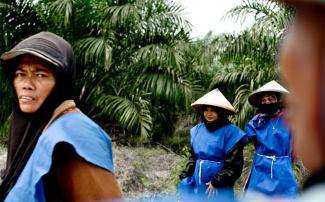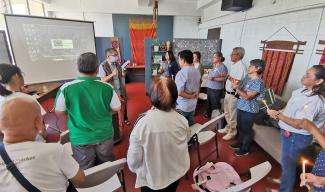Sawit Watch, Greenpeace and ELSAKA organized a workshop on May 12, 2015 at Hotel Kartika Dyandra, Medan. The workshop was joined by: the Labor Organisation, NGOs, the national Government, an Oil Palm Plantation Company, Academicians, People's Organization and individuals who have advocated for palm oil plantation workers.
This workshop was meant to give an insight to the participants about the importance of labor in the productivity of oil palm plantations in Indonesia. By initiating an open dialogue participants were able to share experiences. Through the open dialogue more information about violation of labor righs came forward and provided an excellent opportunity to come up with solutions and recommendations.
The speakers during the workshop were the Minister of Labor, the Director General of Industrial Relations and Worker Social Security, the Executive Director of Sawit Watch-Bogor, the Chairman of Commission E DPRD (parliament) North Sumatra, the Chairman of GAPKI and theChairman of the Indonesian Plantation Workers Union (SBPI).
In 2014, oil palm plantations in Indonesia reached 14.3 million hectares, 30% of which are owned by farmers. Oil palm plantations are one of the most labor intensive markets. The Chamber of Commerce (KADIN) noted there are 21 million workers both direct and indirect. Sawit Watch recorded there are 10.4 million people, of which 70% have the status of casual laborers.
"Jokowi just set policies for to turn palm oil into biofuel.This will increase the potential for employment. Can we be part of it ? or just are we to be a provider of cheap labor, both unskilled and vulnerable ?, "said Jefri Gideon Saragih, Executive Director of Sawit Watch.
As an industry, large-scale oil palm plantations give benefit the country. The Ministry of Trade Indonesia in 2012 stated that the Oil palm plantation is the second biggest foreign exchange earner after oil and gas. The resulting foreign exchange amounted to USD 21 billion, or around Rp 205 trillion. The foreign exchange earnings are equivalent to 13.7% of Indonesian non-oil exports, which amounts to USD153 billion.
Million of workers are working in the old palm plantations in Sumatra and new areas in Kalimantan, Sulawesi and Papua. Oil industry does provide a great advantage for businesses and the state, but the benefits are not seen among the working class. Sawit Watch's research discovered experienced worker mistreatment, low wages, high targets, imposition of fines, pressure and intimidation for establishing an union, lack of working tools,lack of decent personal protective equipments, minimal water and health facilities and child labor.
Article 10 of the Minister of Labor Decree No. 100/2004 regulates " the implementation of employment agreements with specified time". It gives an extension to the working status of casual workers (BHL). Casual workers do not have documentation of work engagement or certainties about status increasement. In addition, wages are based on the achievement of work,without health insurance protection.
Minister of Labor, Hanif Dhakiri felt it somewhat ironic that the attention of the plantation sector is the issue of land grabbing, not labor. Minister Hanif noted several important issues of this sector of which one is the absence of a contract of employmentfor employees. There is no formalization of a raise each year, not all workers are accommodated into BPJS (social security) and the availability of K3 (personal protections and working tools) is not prioritized.
"The plantation sector contribution to Indonesia's foreign exchange was 13 billion, but the workers are forgotten. Every year industry workers receive a raise, but plantation workers do not get one. There needs to be certainty both for workers as for companies. Certainty for workers of wage increases each year and certainty for employers that wage increases are predictable, "said Hanif.
Moreover, freedom of association is an issue that should always get attention. Companies that prohibit this can be convicted.
At the end of his presentation, Minister Hanif stated that the current government has been more open and hopes the movement no longer sees the government as opponents, but rather as partners. In addition, Minister Hanif also hopes for alternative recommendations from participants to address issues of labor protection.




